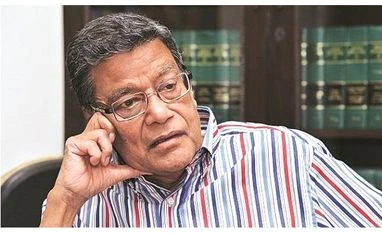On the first day of the Union government’s arguments in the final Aadhaar case hearing, Attorney General (AG) K K Venugopal appeared in front of a five-judge constitutional Bench of the Supreme Court (SC). While arguing that Aadhaar data remains safe and secure, the AG said that the Aadhaar data remains secure behind a complex that has It's 13-ft high and five feet thick walls.
AG based his arguments on better welfare targeting due to Aadhaar and said that because of privacy concerns of a few, people cannot be denied efficient, transparent delivery of services. In a first, he further pushed for putting up two LCD screens inside the courtroom so that the Unique Identification Authority of India Chief Executive Officer Ajay Bhushan Pandey can give a “practical presentation” in an open court on Thursday.
The judges, meanwhile, asked the AG to first argue on the legal contentions first and asked the government to respond to all the arguments made by the petitioners.
The petitioners argued for 19 days in court and challenged the constitutionality of Aadhaar on various fronts, including privacy concerns, data breaches and exclusion of a large population from availing of services and subsidies due to failure of Aadhaar systems or non-availability of the unique identification number.
Started in 2009, the unique identification system has captured the demographic and biometric details of almost 1.19 billion citizens, according to official data. The government argued it was purely voluntary till September 2016. So, the question of coercion does not arise. The SC Bench, however, said there is a clash between the right to life and the right to privacy, with people being excluded from accessing services for want of an Aadhaar number.
Justice Sikri cited multiple affidavits filed in the court, which corroborate the same. Sikri also said that those who signed up till 2016 did not give their informed consent for Aadhaar to be used for delivering welfare and subsidies.
According to lawyers present inside the courtroom, the AG also cited the famous Rajiv Gandhi statement claiming that out of ~1 sent for welfare, only 15 paise reaches the poor. To this, Sikri joked that this claim was rebutted by economists later and 17 paise reaches the poor instead of 15 paise.
“It cannot be doubted that with UID/Aadhaar, much of the malaise in this field can be taken care of,” AG stated in his 51-page written submission to the SC. The submission also argued that Aadhaar can be used to help combat terrorism and maintain law and order.
“Aadhaar, or UID, which has come to be known as the most advanced and sophisticated
infrastructure, may facilitate law enforcement agencies to take care of the problem of terrorism to some extent and may also be helpful in checking crime and help investigating agencies in cracking the crimes,” the statement said.
In arguing for making Aadhaar mandatory for services, he said that 300 million people in India are poor and they cannot be denied services just because a few people are concerned about privacy. He also said that the reported deaths in Jharkhand due to Aadhaar were actually not so as one of those dead had ~30,000 in their bank account; they could not have died of starvation.
While the SC had earlier passed an interim order staying the linking of Aadhaar with mobile phones, bank accounts and other services except government subsidies, the final outcome of the case is expected to determine the legality and validity of the unique identification number and whether it will remain mandatory to obtain and link with services or not.
Before the court rose for the day, Justice D Y Chandrachud observed that financial exclusion is a reality in the country which cannot be denied.
“We should acknowledge that there is a problem of financial exclusion in our country. The Cabinet secretary had agreed. To say that someone has not come to court therefore there is no exclusion is wrong,” he said.
Unlock 30+ premium stories daily hand-picked by our editors, across devices on browser and app.
Pick your 5 favourite companies, get a daily email with all news updates on them.
Full access to our intuitive epaper - clip, save, share articles from any device; newspaper archives from 2006.
Preferential invites to Business Standard events.
Curated newsletters on markets, personal finance, policy & politics, start-ups, technology, and more.
)